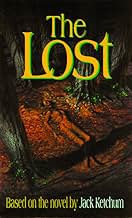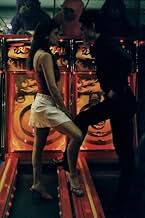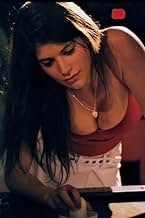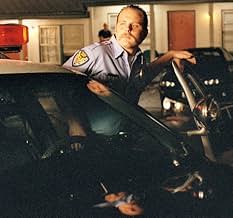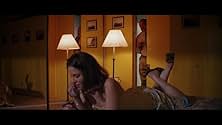19-year-old Ray Pye murders two young women. Four years later, detective Charlie Schilling knows that Ray did it. He just needs to prove it. Meanwhile, Ray has met his match in a new girl in... Read all19-year-old Ray Pye murders two young women. Four years later, detective Charlie Schilling knows that Ray did it. He just needs to prove it. Meanwhile, Ray has met his match in a new girl in town, Katherine Wallace.19-year-old Ray Pye murders two young women. Four years later, detective Charlie Schilling knows that Ray did it. He just needs to prove it. Meanwhile, Ray has met his match in a new girl in town, Katherine Wallace.
- Awards
- 2 wins & 1 nomination total
Dee Wallace
- Barbara Hanlon
- (as Dee Wallace-Stone)
- Director
- Writers
- All cast & crew
- Production, box office & more at IMDbPro
Featured reviews
The Lost starts like a fairy tale. Once upon a time there was a boy called Ray Pye. He put crushed beer cans in his boots to make himself look taller. We meet him with his two friends, Tim and Jennifer, in the campgrounds of a wood. Ray strolls towards a wooden toilet cubicle erected on the hill, the door opens, and a naked girl steps out, quickly apologising as she thought she and her friend were alone. The image is so startling that you know at once this will be no ordinary movie.
Ray has killed rabbits before and decides to kill the girl and her friend, to 'see what it feels like'. Tim and Jennifer, whom he dominates, are coerced into covering up. Four years later, Ray hasn't been caught, in spite of one cop who is determined to make him pay. Ray goes on to much nastier things.
If The Lost teeters on the edge of violence that is so extreme as to revolt most audiences, the question that will hover in the mind of many serious viewers will be whether the end is going to justify the content. Some will not stay that long - in the screening I went to, several people, after a section of intense and escalating violence, walked out at a point where a pregnant woman is stabbed in the back. You have to be able to stomach quite a lot, calmly to consider whether the film, in spite of this, has artistic merit. During the end credits, it says, "If you liked the movie, read the book. If you didn't like the movie, read the book." Ironically, many may not have stayed to this point.
While the film is not a masterpiece, I will argue that it does have considerable artistic merit, even if I feel slightly uncomfortable at disenchanted, gun-toting American teenagers watching it. It delivers both in style and in substance, and if censors want to intervene, that is maybe more a reflection on the people they think might be influenced by it than on its standing as new, invigorating and perfectly valid art-house cinema.
Firstly, the film gets a reaction. Not one of bored disgust - it provokes a gut-feeling, it makes the audience test and question its own tolerance levels. The acting is good all-round, but that of the lead character particularly memorable. His psychotic, drug-fuelled mannerisms stick in the brain like a traumatic encounter. The storyline and editing are stylish. Characters, almost in keeping with the once-upon-a-time introduction, have a two-dimensional quality, like those in fairy stories and we tend to see only traits that are essential to the plot. The characters' development does not go so far as being tongue in cheek or a caricature, but reaches an almost symbolic level where they become ciphers in a particularly challenging onslaught to the senses.
The cinematography and art direction is inventive. There will be switches to high grain film, or unnerving mixes of slow motion, missing frames and superimposed images. The bedrooms of Ray, and also Katherine, a lush that he falls in love with, use vivid reds and blacks to create a surreal effect, and props that include a statue of a black panther. Ray wears black eye make-up, throwing himself into a Bowie-esquire larger-than-life image to give himself an almost god-like appeal to the other, less dominant, teenagers. In contrast, when he finally comes clean about 'the worst thing he ever did', he is sitting dressed in black but on a pure white sofa and background. Katherine, who thinks at first she can 'handle' him, puffs languorously at a cigarette through red lips as Ray talks and she becomes sexually aroused.
Marc Senter's performance (as Ray) is like a turbine that drives the film ever faster forward. The potent soundtrack reflects a cocaine-frenzied adrenalin rush, and even the 'normal' characters offer only some queasy sense of relief. There is 60yr old Ed, for instance, who is in a relationship with teenager Sally; and Detective Charlie Schilling (Michael Bowen), who might seem crazy until you put him next to Ray. Unlike many films that try to capitalise on excessive violence, The Lost wins partly because it is not repetitive. There is nasty violence, quick violence, prolonged violence, mental torture with cruel and violent treatment, 'justified' violence and sick violence. Then there is even offhand violence - "I didn't like you anyway," says Ray as he aims and fires, killing someone with all the casual pride of a sharpshooter at a fairground. (In case you haven't guessed, there is quite a lot of violence!) Supporting scenes draw on popular subculture for realism, such as the rush to flush drugs (grass) down the toilet with limited success when the cops try to bust a party, or the 'friend' who tries to shave an unnoticeable amount of resin from Ray's cannabis delivery. Sensuous, opulent, and recognising few limits, The Lost strains at the sequins to be a cult nasty and succeeds. Even the sex scenes throw in a level of wit not found in the average shocker. "I'm sorry that was a little fast," says Ray after f*cking Katherine the first time. "I've had it faster," she retorts nonchalantly.
While featured songs such as "Drink, Fight, F*ck," might sum up the superficial ethos of the film, it rises well above the trailer-trash slasher that it could easily have become. More concise and elegant than Freeway, more intelligent and visceral than Natural Born Killers, demonstrating a considerable array of talent in its determination to shock that was so noticeably absent in The Great Ecstasy of Robert Carmichael, less high-brow than Irreversible, and more hypnotic than American Psycho. The Lost, however repugnant many people will find it, lives up to its promise of being controversial and worthy of attention by all lovers of the genre.
Ray has killed rabbits before and decides to kill the girl and her friend, to 'see what it feels like'. Tim and Jennifer, whom he dominates, are coerced into covering up. Four years later, Ray hasn't been caught, in spite of one cop who is determined to make him pay. Ray goes on to much nastier things.
If The Lost teeters on the edge of violence that is so extreme as to revolt most audiences, the question that will hover in the mind of many serious viewers will be whether the end is going to justify the content. Some will not stay that long - in the screening I went to, several people, after a section of intense and escalating violence, walked out at a point where a pregnant woman is stabbed in the back. You have to be able to stomach quite a lot, calmly to consider whether the film, in spite of this, has artistic merit. During the end credits, it says, "If you liked the movie, read the book. If you didn't like the movie, read the book." Ironically, many may not have stayed to this point.
While the film is not a masterpiece, I will argue that it does have considerable artistic merit, even if I feel slightly uncomfortable at disenchanted, gun-toting American teenagers watching it. It delivers both in style and in substance, and if censors want to intervene, that is maybe more a reflection on the people they think might be influenced by it than on its standing as new, invigorating and perfectly valid art-house cinema.
Firstly, the film gets a reaction. Not one of bored disgust - it provokes a gut-feeling, it makes the audience test and question its own tolerance levels. The acting is good all-round, but that of the lead character particularly memorable. His psychotic, drug-fuelled mannerisms stick in the brain like a traumatic encounter. The storyline and editing are stylish. Characters, almost in keeping with the once-upon-a-time introduction, have a two-dimensional quality, like those in fairy stories and we tend to see only traits that are essential to the plot. The characters' development does not go so far as being tongue in cheek or a caricature, but reaches an almost symbolic level where they become ciphers in a particularly challenging onslaught to the senses.
The cinematography and art direction is inventive. There will be switches to high grain film, or unnerving mixes of slow motion, missing frames and superimposed images. The bedrooms of Ray, and also Katherine, a lush that he falls in love with, use vivid reds and blacks to create a surreal effect, and props that include a statue of a black panther. Ray wears black eye make-up, throwing himself into a Bowie-esquire larger-than-life image to give himself an almost god-like appeal to the other, less dominant, teenagers. In contrast, when he finally comes clean about 'the worst thing he ever did', he is sitting dressed in black but on a pure white sofa and background. Katherine, who thinks at first she can 'handle' him, puffs languorously at a cigarette through red lips as Ray talks and she becomes sexually aroused.
Marc Senter's performance (as Ray) is like a turbine that drives the film ever faster forward. The potent soundtrack reflects a cocaine-frenzied adrenalin rush, and even the 'normal' characters offer only some queasy sense of relief. There is 60yr old Ed, for instance, who is in a relationship with teenager Sally; and Detective Charlie Schilling (Michael Bowen), who might seem crazy until you put him next to Ray. Unlike many films that try to capitalise on excessive violence, The Lost wins partly because it is not repetitive. There is nasty violence, quick violence, prolonged violence, mental torture with cruel and violent treatment, 'justified' violence and sick violence. Then there is even offhand violence - "I didn't like you anyway," says Ray as he aims and fires, killing someone with all the casual pride of a sharpshooter at a fairground. (In case you haven't guessed, there is quite a lot of violence!) Supporting scenes draw on popular subculture for realism, such as the rush to flush drugs (grass) down the toilet with limited success when the cops try to bust a party, or the 'friend' who tries to shave an unnoticeable amount of resin from Ray's cannabis delivery. Sensuous, opulent, and recognising few limits, The Lost strains at the sequins to be a cult nasty and succeeds. Even the sex scenes throw in a level of wit not found in the average shocker. "I'm sorry that was a little fast," says Ray after f*cking Katherine the first time. "I've had it faster," she retorts nonchalantly.
While featured songs such as "Drink, Fight, F*ck," might sum up the superficial ethos of the film, it rises well above the trailer-trash slasher that it could easily have become. More concise and elegant than Freeway, more intelligent and visceral than Natural Born Killers, demonstrating a considerable array of talent in its determination to shock that was so noticeably absent in The Great Ecstasy of Robert Carmichael, less high-brow than Irreversible, and more hypnotic than American Psycho. The Lost, however repugnant many people will find it, lives up to its promise of being controversial and worthy of attention by all lovers of the genre.
Caught a special screening of The Lost this past weekend at Horrorfind Weekend in Hunt Valley, Maryland where author Jack Ketchum was in attendance. Ketchum introduced the film by saying how impressed he was with the end result. An opinion I share whole heartedly. First of all, the cast is a top notch mix of veteran character actors and relative novices, all of whom are very good at what they do. This is something one doesn't often see in such a low budget project. Many familiar faces grace the screen and talented ones at that. It is the presence of such a cast that sets the film apart from the crowd right at the start. The Lost also has a great look to it. Aesthetically speaking, the film doesn't appear to be as low budget as it actually is. That's an element which can really hold a film back and one which I was afraid might be an issue here. Fortunately the film looks wonderful. As I mentioned, The Lost is a very faithful adaptation of Ketchum's book. This isn't to say that a few liberties aren't taken. Nothing that should offend fans of the book though.
In all, The Lost is a very satisfying film which Ketchum fans should enjoy. Hopefully the film will be shown the appreciation it truly deserves.
In all, The Lost is a very satisfying film which Ketchum fans should enjoy. Hopefully the film will be shown the appreciation it truly deserves.
The Lost is a film that had a lot of potential, some great directing, a good cast, and a decent script. The problem is that it goes on forever.
The movie starts with a bang, and then kind of slows down, and the audience is given a group of characters to follow around. It is during this part of the film that all structure falls away, and things just kind of float. There is no real movement. Now, The Lost is based off of a novel, and the scenes in the novel probably had a bit more power because the reader can get into the character's head. It is much harder to do that in film, and because of that the importance of some of the scenes is unclear. Whole scenes could have been excised, and nothing would have been taken away from the story.
Then we get to the ending. I'm not going to say what happens, but I will say that it is very easy to see when things are starting to pick up and get back on track, and once they do, all bets are off. The ending of this film is one of the most disturbing and painful things I have ever watched in my life. The thing is, the audience knows that this is coming, but still, it is hard to brace yourself for the intense cruelty that you'll witness.
This is a film that gets an A for effort, but a C+ for execution. While the beginning and the end are tight, the middle of the film seems to lack direction and focus. Nothing happens, and very little is gained. So, this one is a rental.
The movie starts with a bang, and then kind of slows down, and the audience is given a group of characters to follow around. It is during this part of the film that all structure falls away, and things just kind of float. There is no real movement. Now, The Lost is based off of a novel, and the scenes in the novel probably had a bit more power because the reader can get into the character's head. It is much harder to do that in film, and because of that the importance of some of the scenes is unclear. Whole scenes could have been excised, and nothing would have been taken away from the story.
Then we get to the ending. I'm not going to say what happens, but I will say that it is very easy to see when things are starting to pick up and get back on track, and once they do, all bets are off. The ending of this film is one of the most disturbing and painful things I have ever watched in my life. The thing is, the audience knows that this is coming, but still, it is hard to brace yourself for the intense cruelty that you'll witness.
This is a film that gets an A for effort, but a C+ for execution. While the beginning and the end are tight, the middle of the film seems to lack direction and focus. Nothing happens, and very little is gained. So, this one is a rental.
THE LOST is one of the most disturbing real life movies I have ever seen, period. I thought Ketchum's "Girl Next Door" was about as disturbing as you can get, based on a true life crime, but this one is much worse and very graphic. Actually, Ketchum took two real crimes, the first about two women that get shot in a woods because some psycho thinks they are lesbian, and the other crime which occupies the rest of this movie. Ray Pye is a twenty-something psycho, that with his good looks and car and crap attracts a few followers and girls in this small town. He puts smashed beer cans in his boots to make him seem taller. The movie moves ahead four years, after the girls in the woods are killed, and Ray is having a ball, balling who ever he wants, and partying and drugs and the whole nine yards. But his egomaniac world is starting to come crashing down along with his sanity, when his girls start to turn against him, especially the beautiful Katherine (Robin Sydney). He pretty much goes berserk, and the last twenty minutes or so of this movie are very hard to watch, even for this old gorehound. It turns into almost a cross between Last House on the Left and the Manson murders. Ray even references the Manson murders when he takes his hostages into an unsuspecting couples cabin, with a young couple, the wife being pregnant. Even Jack Ketchum says in the commentary how difficult the last twenty minutes were for even him to watch. This is incredibly brutal material folks, and the director holds nothing, and I mean nothing back. Ray looks to me like a young Tom Cruise, or maybe a cross between a young Elvis and Tom Cruise, that seems to be the look he is going for. When he snaps, and I mean snaps, it's like the devil himself has taken him over. This is a hell of a movie, and it did make me flinch a little, and that to me is very impressive. Not for the easily offended for sure, but for everybody else, put "The Lost" on your Want List immediately!!!!!!!!!!!! I could not recommend this extremely disturbing movie any higher. Very very well made by the way.
I saw this film in the Sitges film festival. I like very much. It's a very realistic and visceral drama in the same style of David Cronenberg's a history of violence, Clint Eastwood Mystic River or Sam Peckinpah Strays dogs. The direction & the actors are amazing. The dramatic a violence scenes are excellent & the music that accompanies to them it's great & ideal. The edition of this film are amazing, totally moved away of the video-clip style. The photography is in the same quality of the edition of this movie. The character & the acting of Marc Senter is amazing ... it's in the same style of Christian Bale's Patrick Bateman. Great adaptation of the Jack Ketchum book & excellent American drama.
Did you know
- TriviaBased on Charles Schmid Jr. murders, also known as Pied Piper of Tucson murders.
- Crazy creditsMosquitoes can be heard buzzing when the final credits have rolled.
- ConnectionsFeatures La Nuit des morts-vivants (1968)
- SoundtracksThe Pied Piper
Written by Artie Kornfeld (as Kornfeld) & Steve Duboff (as Duboff)
Performed by Crispian St. Peters
Courtesy of Repertoire Records
- How long is The Lost?Powered by Alexa
Details
- Release date
- Country of origin
- Official site
- Language
- Also known as
- Потерянные
- Production company
- See more company credits at IMDbPro
Box office
- Budget
- $1,000,000 (estimated)
Contribute to this page
Suggest an edit or add missing content



